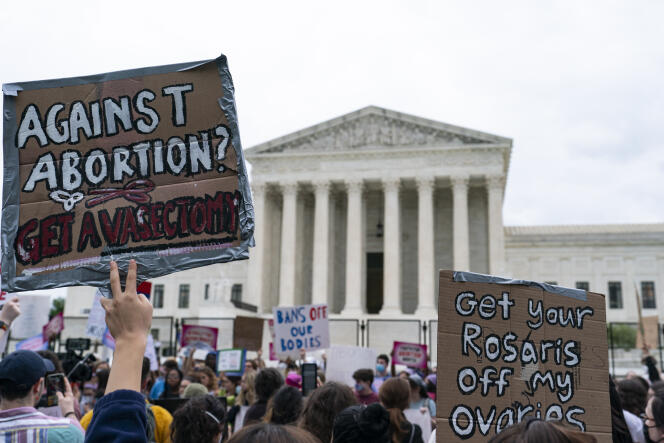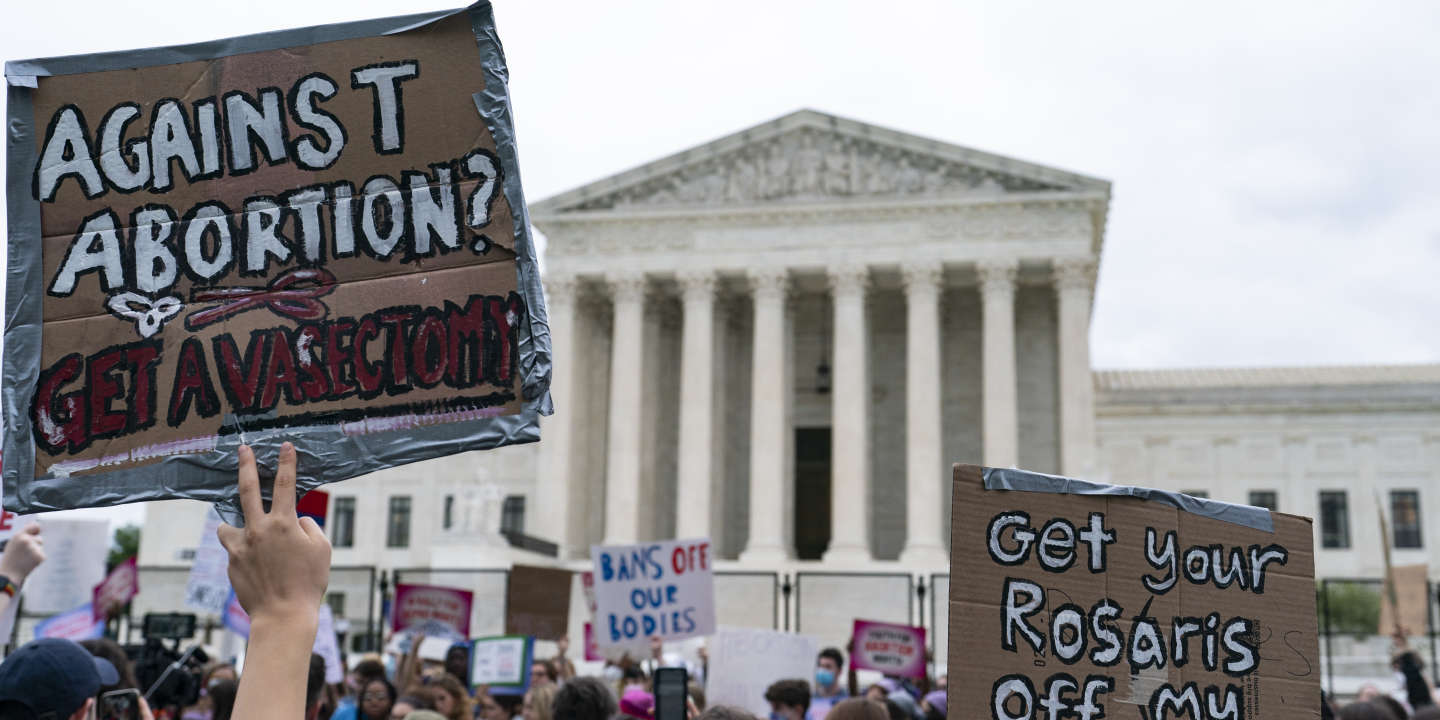
In the United States, all eyes are on the Supreme Court. The institution has been at the heart of a virulent political, legal and social debate since the publication, Monday, May 2 by the site Politico, of a draft judgment from America’s highest judicial institution that could overturn the famous Roe v. Wade of 1973, which protects the right of American women to terminate their pregnancies. If adopted as is, this judgment will send the United States back fifty years, to a time when each state was free to authorize the voluntary termination of pregnancy (abortion), or to prohibit it.
This document, written in February and which can be the subject of negotiations until June 30, considers that the historic decision Roe v. Wade, was « unfounded from the start » and that nothing in the Constitution protects the right to abortion.
As reminded Simon Grivet, lecturer at the University of Lille and historian specializing in the history of law and justice in the United States, it would then be the culmination of a fight by the American religious right which did not has never weakened in fifty years in a country where “abortion is a structuring political marker”.
The abortion debate has never ceased to divide the United States despite the 1973 Supreme Court decision, which legalized abortion. How to explain it?
It must be borne in mind that the United States clearly stands out from other Western democracies on the subject of abortion. In most countries, as in France, opposition to abortion still exists, but it has become marginal after legalization. In the United States, that has never been the case. On the contrary, after the establishment of this right, abortion became a structuring political marker in the country. The decision that the Supreme Court is about to render is the culmination of a fight by the religious right against abortion that has not weakened in fifty years.
Remember that the right to abortion in the United States was obtained by a decision of the Supreme Court and not by a traditional political and democratic process. Even if it was returned by a large majority of seven votes to two, it never achieved consensus and interrupted, at the time, a political process that was underway. New York State made abortion legal in 1970 with the support of Republicans. Oregon, through a referendum, did the same. The Court’s decision in 1973, which prohibited States from prohibiting abortion before the end of the first trimester of pregnancy, thus halted this political dynamic. A mighty move « pro-life » [« pro-vie », anti-IVG] was born in reaction with the ultimate objective of overturning this case law. This question was the determining factor in the politicization of an entire religious section of society.
Republican politicians quickly understood the power of this anti-abortion argument to win votes, which made the subject a real political issue. The evangelical right now represents a quarter of voters and is in the majority in some parts of the South and Midwest, such as Indiana. These are mainly white Christians, but it also has links in certain African-American churches and, increasingly, in the Catholic Church, which is very influential among Hispanics. Taking a position against abortion can win a lot of voters but also decisive voices among minorities.
This is how the Republicans strengthened their base in the southern states of the country, which were Democratic strongholds until the 1960s. For his 1980 campaign, Ronald Reagan traveled a lot to these southern states where he displayed his faith and his opposition to abortion. This right can only be removed by a decision of the Supreme Court, from the election of Reagan, opposition to abortion thus becomes the determining criterion for Republicans when it comes to choosing a federal magistrate.
What role did Donald Trump play in what could be the culmination of the demands of the « pro-life » movement?
Donald Trump has been the instrument of this long-term strategy of the religious right. In the summer of 2015, when he launched his campaign, he was very marginal within the Republican Party and he needed the support of the evangelical right. The latter watches him from afar, he who is a man of television, a former casino owner, divorced twice, moreover.
He secured their support by focusing his speech on law and order, displaying his uninhibited Islamophobia and, above all, playing the anti-abortion card by promising to appoint opposing Supreme Court justices. in Roe v. Wade. He agreed to follow the recommendations of the Federalist Society, a very conservative lobby which draws up lists of magistrates won over to a legal ideology according to which the 1973 judgment is an interpretation of the Constitution which has no place to be.
The three magistrates that Donald Trump had to appoint during his mandate are in line with this. At the same time, we see that the Democrats have invested little in this strategy of appointments within the highest court in the country. Today, we take the full measure of this heritage: the Supreme Court is mainly won over to the conservative right and it will be for many years to come.
What is the “legal ideology” that characterizes the majority of these Supreme Court judges and does it imply other reversals of jurisprudence?
A fundamental debate has structured American democracy for at least a century: how should new rights be obtained? Through the Supreme Court or through political action? This question includes that of the role to be played by the Supreme Court and, on this subject, two visions clash in the United States. There is what is called « judicial activism », which evokes above all the time when the Court was headed by Earl Warren, between 1953 and 1969. This « Warren Court », which notably abolished racial segregation, used several major cases of the 1950s and 1960s to materialize, thanks to its decisions, progressive advances at a time when many reforms were blocked at the level of the United States Congress.
An opposing judicial ideology was born in the 1970s: that of “judicial modesty”, which is embodied in particular in a so-called “originalist” or “textualist” current. The magistrates of this current – several of whom now sit on the Supreme Court – defend a very literal interpretation of the Constitution. For them, everything that is not written in the text does not exist.
However, several rights granted over the past sixty years, in particular by the “Warren Court”, are based on sometimes fragile interpretations of the Constitution and could therefore be called into question by judges who defend a literal reading. This is the case of the “right to privacy”, established by the Supreme Court in 1965 in its decision on the right to contraception. It is the existence of this right that also underlies the 1973 decision on abortion, or even the rights granted to LGBT people, such as the right to marriage for all. This right to privacy, which has become decisive, is not enshrined as it is in the Constitution, it stems from the interpretation of the fundamental text by one of the judges at the time.
The danger is not certain, however: the Supreme Court has not rendered its decision in Roe v. Wade, and Judge Alito [l’auteur du texte qui a fuité dans la presse] insisted on the particular nature of the question of abortion, suggesting that such a reversal of case law would not be envisaged for other rights.
If the Court endorsed this decision and reversed Roe v. Wade, only a federal abortion law could guarantee it to every woman in the country. Is it possible ?
No. The Democrats do not have a majority in the Senate and therefore cannot pass an abortion law. They will nevertheless submit a text, essentially to mobilize their base six months before the mid-term elections. We bet that abortion will be a central subject of the November election.
